[ANSWERED] What is a Long-Term Care (LTC) Pharmacy
In this blog, we’ll explore how LTC pharmacies support residents, staff, and facilities across the long-term care spectrum.

Did you know that there are about 15,300 nursing homes in the United States and they care for more than 1.3 million residents? These numbers show just how many people truly depend on long-term care every single day. With an aging population, the demand for long-term care facilities and long-term care services continues to grow more and more every year.
Many residents in these long-term care (LTC) settings are taking multiple prescriptions daily, and having to keep track of these medications can be overwhelming for both seniors and their caregivers, whether they are living at home, in assisted living communities, or in a nursing home.
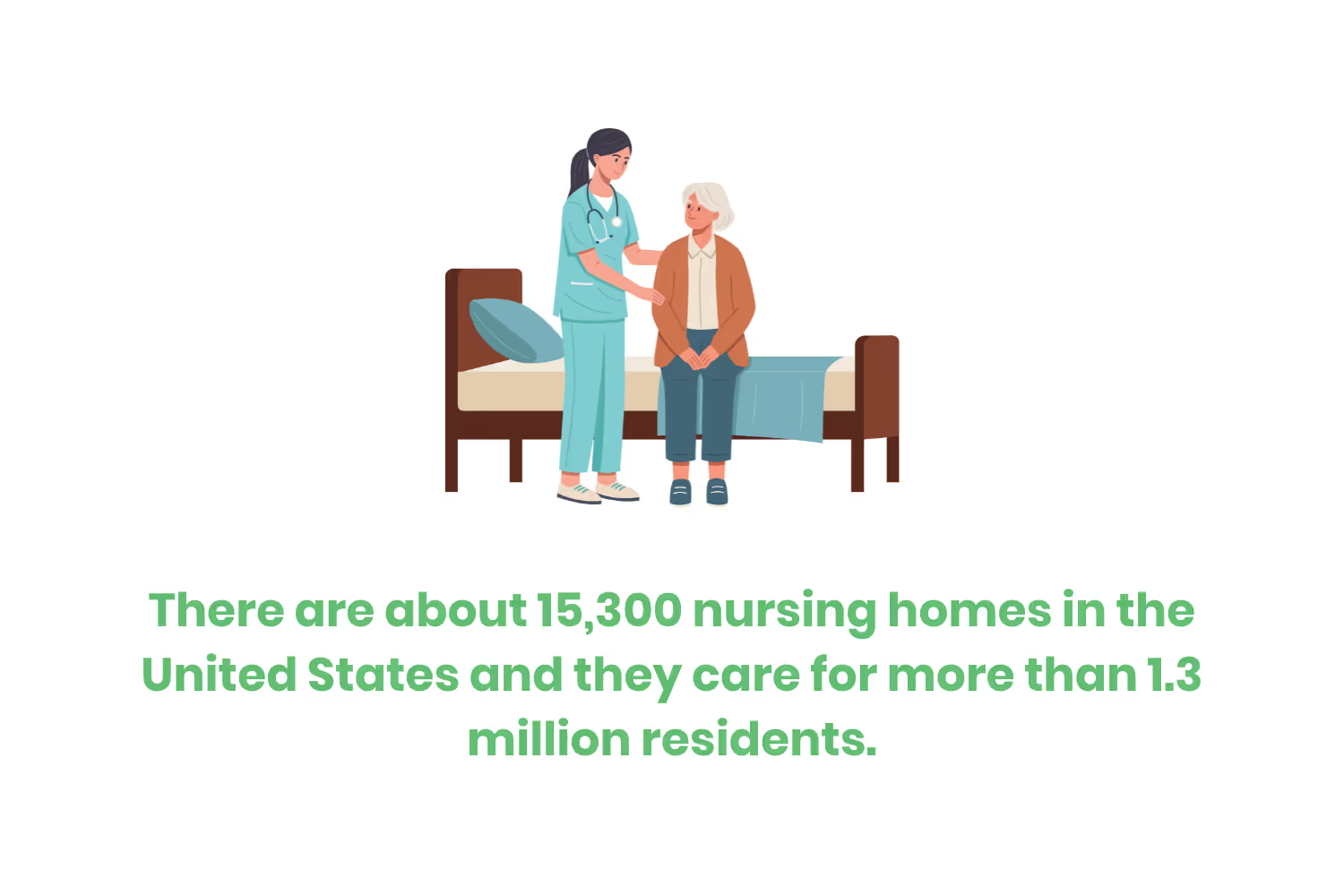
Safe and consistent medication management isn't just a convenience; it is a necessity for protecting health and quality of life.
This is where pharmacies play a crucial role in providing a comfortable living situation. They go beyond simply filling prescriptions. They offer specialized medication packaging, around-the-clock support, and preventive care such as vaccination programs.
In this blog, we’ll explore how LTC pharmacies support residents, staff, and facilities across the long-term care spectrum.
What Are Long-Term Care Pharmacies?
Before you can fully understand what long-term care pharmacies can do, let's get started with the basics.
Long-term care pharmacies are specialized providers that focus on serving residents who live-in long-term care facilities such as assisted living facilities, skilled nursing facilities, and senior living communities.
Unlike a standard retail pharmacy, LTC operations are designed for people who need continuous support, often managing multiple prescriptions everyday.
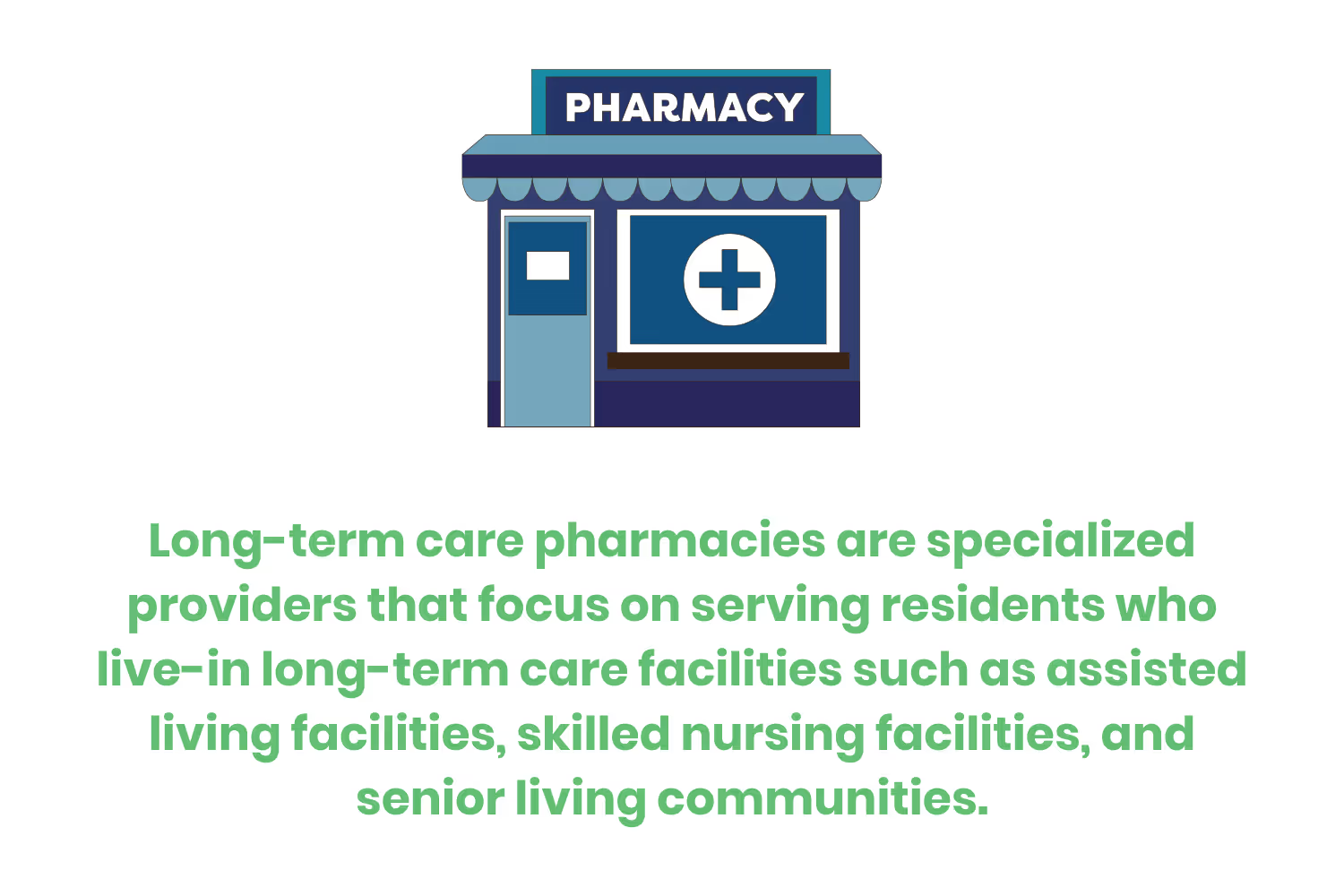
These pharmaceutical services ensure that medications are dispensed safely, delivered on time, and are tailored to the unique needs of each facility and the needs of individuals living there.
By supporting both residents and their caregivers, LTC pharmacies provide consistent access to long-term services and support. They ensure the safe use of medications and reduce the chance of medication-related issues. These pharmacies promote health, safety, and independence in care facilities such as nursing homes.
How Do LTC Pharmacies Differ from Retail Pharmacies?
You may be asking what the difference is between LTC pharmacies and retail pharmacies.
Let's briefly discuss the differences. An LTC pharmacy focuses on bulk-filing prescriptions that are delivered directly to assisted living facilities, skilled nursing facilities, and living communities.
This system allows residents in these settings to have easier access to the life-saving medications they need. By comparison, a traditional retail pharmacy is a traditional model where individual patients walk in and purchase their prescription directly in-store.
What Services Do Long-Term Care Pharmacies Provide?
LTC pharmacists do not just deliver medication. The services provided play a large role in overall patient care within long-term care facilities.
Medication dispensing:
Medication dispensing is the first thing you may think a LTC pharmacy would do.
Except they do not just fill prescriptions, they organize medications in specialized packaging, examples would be unit-dose packets or blister packs, to ensure the safe administration of medication and reduce errors that can come with administering medication.
The organization of medications makes it easier for staff and residents to administer medications safely and on time.
Emergency services:
Residents in long-term care settings may have sudden or urgent care needs. LTC pharmacies provide 24/7 emergency delivery to ensure that no resident goes without essential treatments.
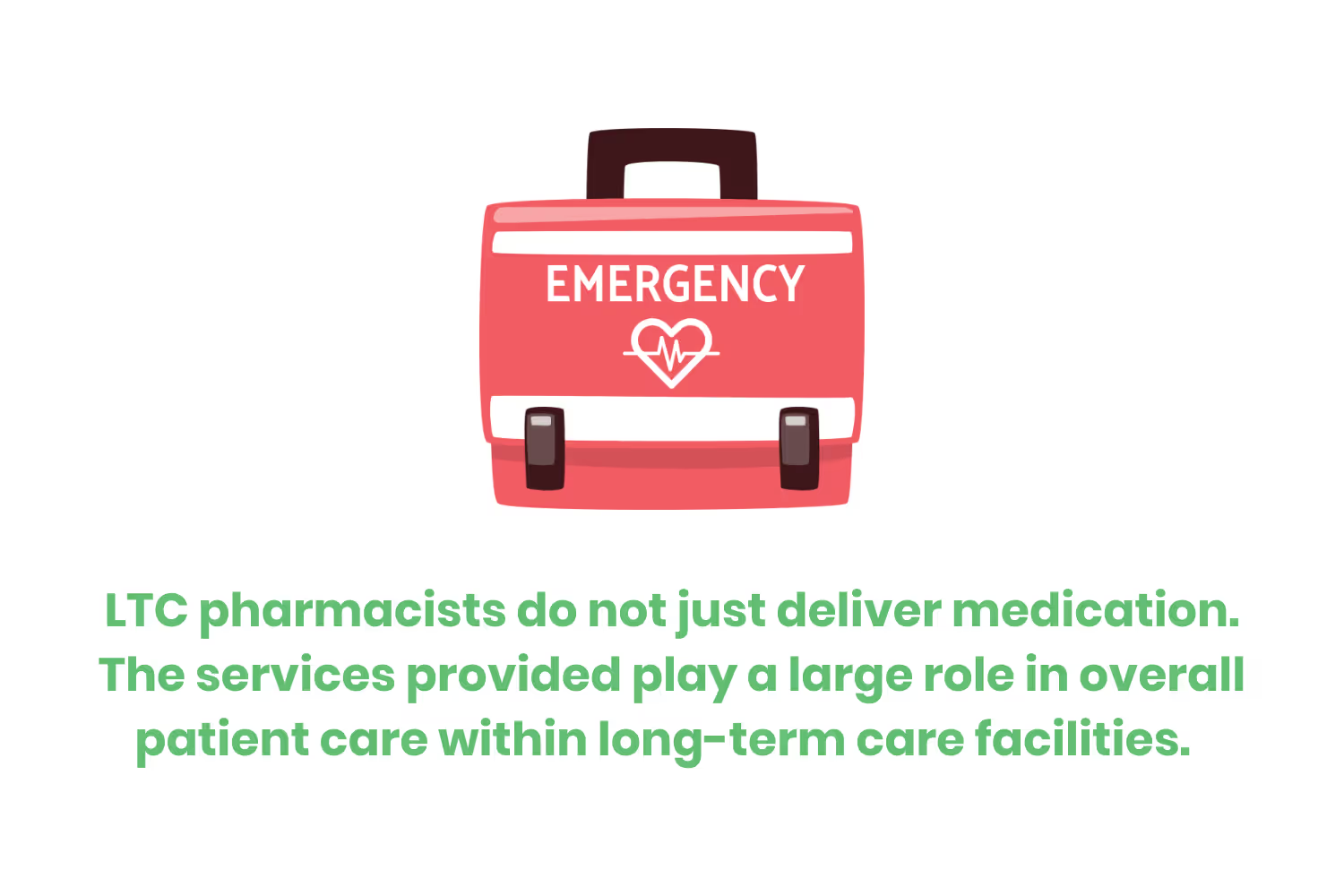
Pharmacist support:
The facility staff and caregivers can rely on pharmacists for around-the-clock guidance. Whether it’s confirming a dosage,identifying drug interactions, or adjusting a prescription, pharmacists act as trusted clinical partners. This allows the staff to know exactly what is going on with no guesswork involved.
Preventive care:
Many LTC pharmacies also provide vaccination programs, wellness checks, and health education. These services support overall resident well-being and help facilities meet preventive care standards. Having access to these services makes it easier for patients to get this preventive care, without having to leave the facility.
What Types of Facilities Use Long-Term Care Pharmacy Services?
Assisted living facilities:
An assisted living community supports residents who live mostly independently but need help with daily tasks like managing prescriptions.
Some residents may be able to function alone, but may forget when or if they have taken their medication, which can lead to further health problems.
LTC pharmacies assist by delivering medications, providing special packaging, and supporting caregivers with safe administration.
Skilled nursing facilities:
Skilled nursing facilities provide round-the-clock medical care for residents with complex health needs for when patients are in more need of help when performing daily tasks.
LTC pharmacies supply prescription drugs quickly, manage multiple regimens safely, and work closely with nurses and doctors to ensure proper medication administration.
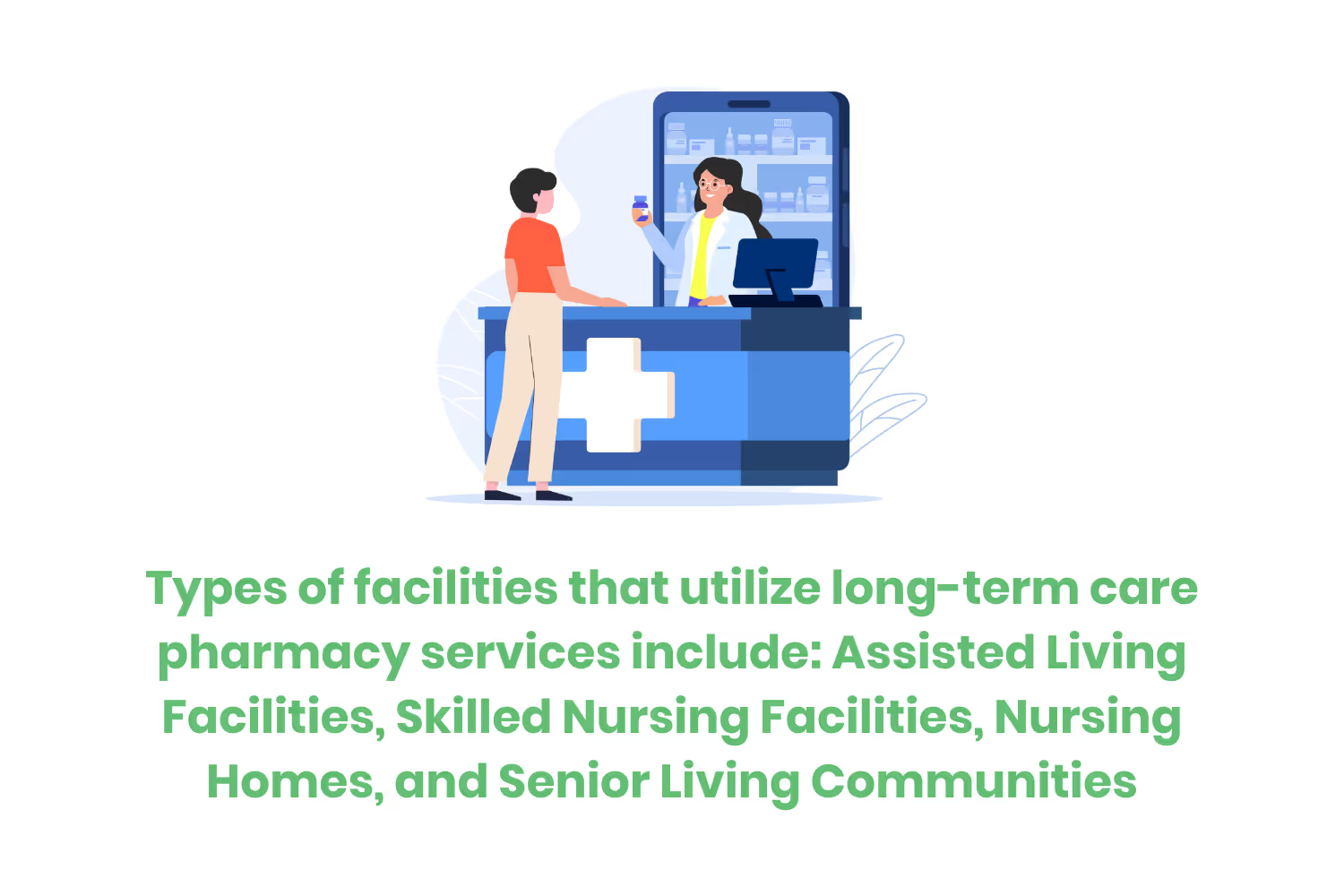
Nursing homes:
Nursing homes care for residents with chronic illnesses or long-term disabilities who can not care for themselves.
LTC pharmacies help by filling prescriptions in bulk, preventing errors, and supporting staff with reliable medication management that improves safety and reduces hospital visits in the long-term setting.
Senior living communities:
Senior living communities house more independent older adults but still benefit from pharmacy support. These patients typically need no help, but may live alone and are at a fall risk, so having supervision makes them and their families more comfortable.
LTC pharmacies provide delivery, medication adherence packaging, and caregiver education, helping residents maintain independence while staying on track with their prescriptions.
What Are the Benefits of Using a Senior Care Pharmacy?
LTC pharmacies do not just benefit the patients. They benefit everyone involved in the process.
For residents, these pharmacies ensure safe and more accurate medication use. With services like unit-dose packaging and pharmacist oversight, seniors are less likely to miss dosages or have a reaction from a harmful drug interaction.
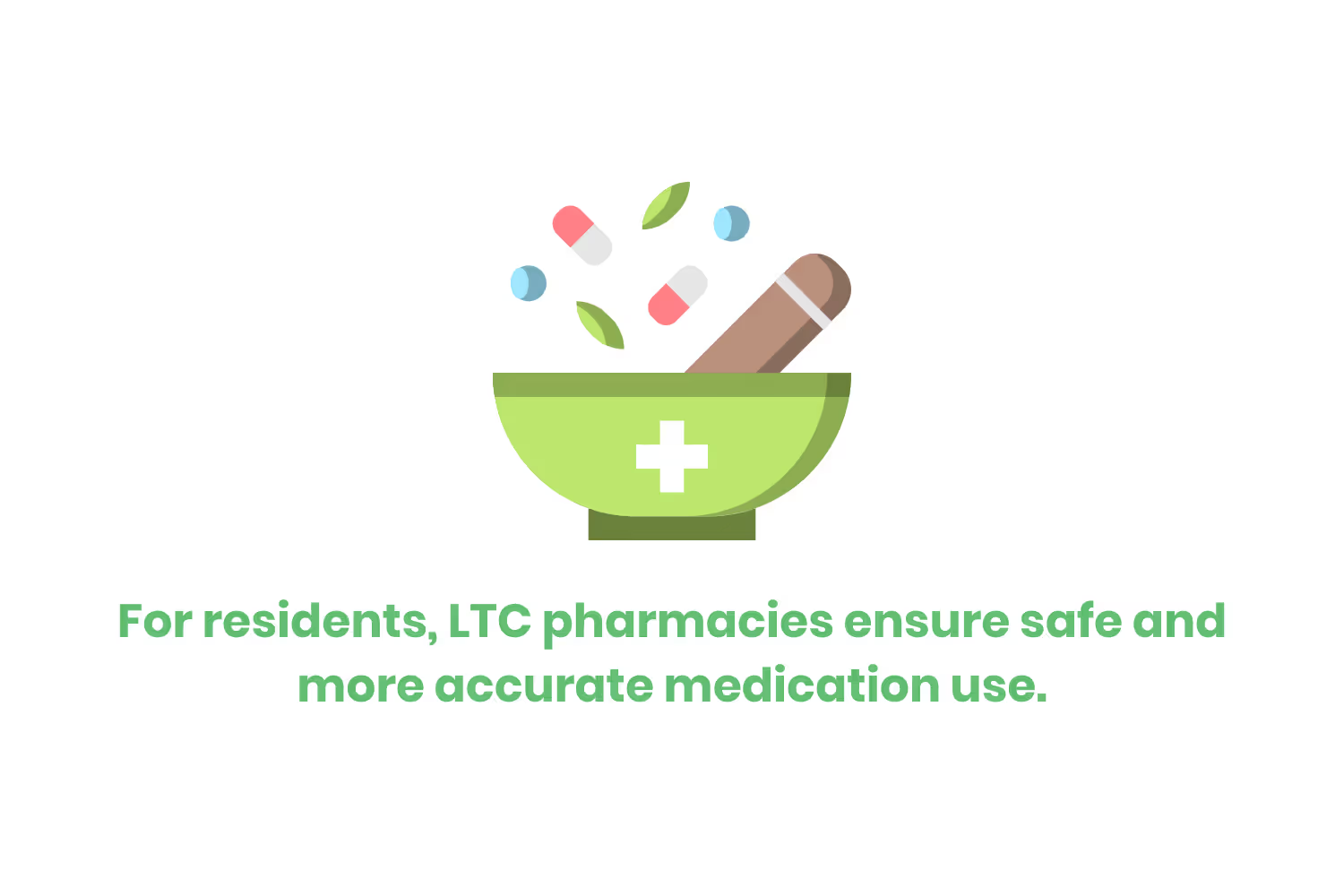
For caregivers and families, LTC services bring peace of mind. They provide guidance on how medication should be taken, support in emergencies, and reduce the stress of managing multiple prescriptions at one time.
Staff and facilities also see advantages. By streamlining the dispensing process, LTC pharmacies play a larger role in saving nurses valuable time and the reduced risk of medication errors.
How Do LTC Pharmacies Collaborate with Healthcare Providers?
Long-term care pharmacies are not stand-alone services, they function as part of a larger care team.
Pharmacists work closely with physicians to review prescriptions, adjust medication therapy, and ensure that residents receive the safest and most effective medication plans. This collaboration helps prevent dangerous drug interactions and supports positive outcomes.
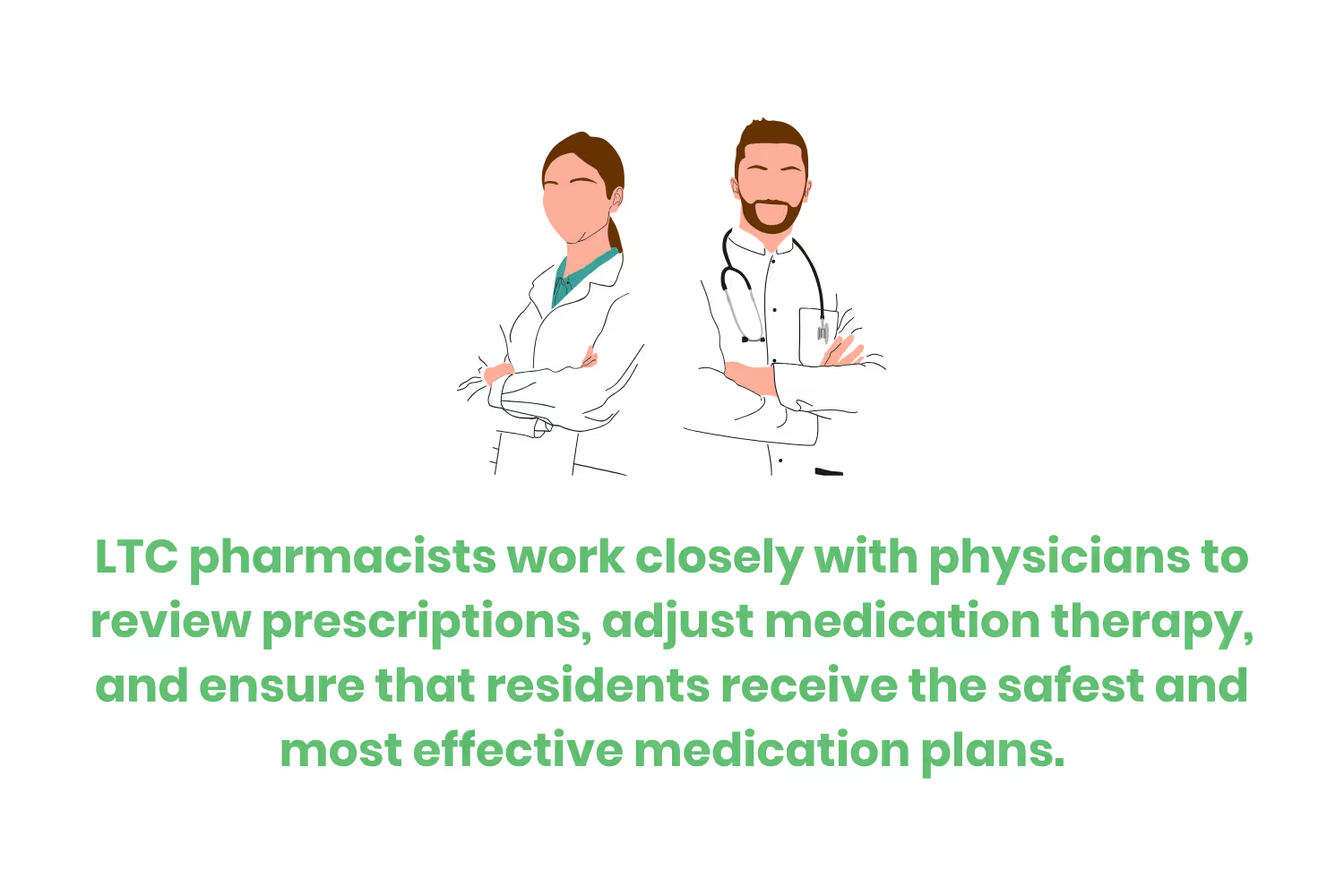
It is not only physicians who collaborate with LTC teams, but nurses also rely on them. Nurses go to LTC pharmacy services to help confirm dosages, addressing side effects, or managing complex regimens. These pharmacists will provide the expertise needed to keep daily care running smoothly.
In some cases collaboration will extend to the caregivers and families as well. Many LTC pharmacies often offer education and training to make it easier for non-medical staff or loved ones to administer medications safely.
Conclusion
Long-term care pharmacies do far more than just deliver medications. They play a crucial role in ensuring safety, health, and comfort for residents in long-term care facilities. From assisted living facilities to skilled nursing and senior living communities, LTC pharmacies provide medication management,preventive services, and vital support for caregivers and staff.
By collaborating with healthcare professionals, they help reduce errors, prevent hospitalizations, and improve the quality of life for residents. As the need for long-term care services continues to rise with an aging population, LTC pharmacies will remain an essential partner helping provide high-quality care.
Emphasize your product's unique features or benefits to differentiate it from competitors
In nec dictum adipiscing pharetra enim etiam scelerisque dolor purus ipsum egestas cursus vulputate arcu egestas ut eu sed mollis consectetur mattis pharetra curabitur et maecenas in mattis fames consectetur ipsum quis risus mauris aliquam ornare nisl purus at ipsum nulla accumsan consectetur vestibulum suspendisse aliquam condimentum scelerisque lacinia pellentesque vestibulum condimentum turpis ligula pharetra dictum sapien facilisis sapien at sagittis et cursus congue.
- Pharetra curabitur et maecenas in mattis fames consectetur ipsum quis risus.
- Justo urna nisi auctor consequat consectetur dolor lectus blandit.
- Eget egestas volutpat lacinia vestibulum vitae mattis hendrerit.
- Ornare elit odio tellus orci bibendum dictum id sem congue enim amet diam.
Incorporate statistics or specific numbers to highlight the effectiveness or popularity of your offering
Convallis pellentesque ullamcorper sapien sed tristique fermentum proin amet quam tincidunt feugiat vitae neque quisque odio ut pellentesque ac mauris eget lectus. Pretium arcu turpis lacus sapien sit at eu sapien duis magna nunc nibh nam non ut nibh ultrices ultrices elementum egestas enim nisl sed cursus pellentesque sit dignissim enim euismod sit et convallis sed pelis viverra quam at nisl sit pharetra enim nisl nec vestibulum posuere in volutpat sed blandit neque risus.

Use time-sensitive language to encourage immediate action, such as "Limited Time Offer
Feugiat vitae neque quisque odio ut pellentesque ac mauris eget lectus. Pretium arcu turpis lacus sapien sit at eu sapien duis magna nunc nibh nam non ut nibh ultrices ultrices elementum egestas enim nisl sed cursus pellentesque sit dignissim enim euismod sit et convallis sed pelis viverra quam at nisl sit pharetra enim nisl nec vestibulum posuere in volutpat sed blandit neque risus.
- Pharetra curabitur et maecenas in mattis fames consectetur ipsum quis risus.
- Justo urna nisi auctor consequat consectetur dolor lectus blandit.
- Eget egestas volutpat lacinia vestibulum vitae mattis hendrerit.
- Ornare elit odio tellus orci bibendum dictum id sem congue enim amet diam.
Address customer pain points directly by showing how your product solves their problems
Feugiat vitae neque quisque odio ut pellentesque ac mauris eget lectus. Pretium arcu turpis lacus sapien sit at eu sapien duis magna nunc nibh nam non ut nibh ultrices ultrices elementum egestas enim nisl sed cursus pellentesque sit dignissim enim euismod sit et convallis sed pelis viverra quam at nisl sit pharetra enim nisl nec vestibulum posuere in volutpat sed blandit neque risus.
Vel etiam vel amet aenean eget in habitasse nunc duis tellus sem turpis risus aliquam ac volutpat tellus eu faucibus ullamcorper.
Tailor titles to your ideal customer segment using phrases like "Designed for Busy Professionals
Sed pretium id nibh id sit felis vitae volutpat volutpat adipiscing at sodales neque lectus mi phasellus commodo at elit suspendisse ornare faucibus lectus purus viverra in nec aliquet commodo et sed sed nisi tempor mi pellentesque arcu viverra pretium duis enim vulputate dignissim etiam ultrices vitae neque urna proin nibh diam turpis augue lacus.




